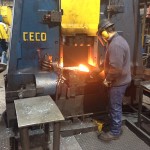Industrial forging is a process of manufacturing that goes back centuries—all the way to blacksmith days. Today, forging is a precise science that requires a high degree of skill and specialized machinery. It is used primarily to create stronger parts and components for machinery, vehicles, and tools.
Let’s take a deeper dive into what exactly custom forging is, how it works, and the benefits of it in the manufacturing industry.
What Is Forging?
Forging involves the shaping of metal with force. The force can be delivered in a number of ways, such as with a hammer. Often, metal is heated up to make it more malleable and receptive to changing shape without cracking or breaking. This is known as hot forging. Cold forging is, of course, forging with unheated metal. For making equipment and tools, hot forging is by far the most prevalent of the two.
By directing force on metal, you can change the shape. The speed, pressure, direction, and force applicator will change and mold the metal in different ways. It takes a lot of expertise to know the most effective way to obtain a particular shape, especially if you need the end result to be tough and durable.
5 Common Types of Industrial Forging
According to Mike Frizzell, the Plant Manager at Martin Tool & Forge, a division of Martin Sprocket & Gear, Inc., there are several different types of custom forging processes that can be used to create machine parts and components:
1. Hammer Forging
A large machine called a power hammer rams down on a red-hot piece of steel. Power hammers have a frame, anvil, and reciprocating ram that holds a hammerhead or a die. Different power hammers have different weights, and can even have their hammers changed out for different shapes or dies.
A die is a mold that can be used to put material into a particular shape. The power hammer operator simultaneously controls the hammer and positions the metal.
2. Press Forging
A press applies tremendous pressure to material in a slow, methodical manner. While a power hammer uses stored weight and impact to shape metal, a hydraulic press uses gradual pressure to squish it into shape. Hydraulic presses can make more substantial changes to metal, but are generally less precise without the aid of a die.
3. Closed-Die Forging
This forging process has a die at both ends of a press or power hammer. The metal is completely enclosed in the die, and pressure is applied.
4. Open-Die Forging
As the name suggests, open-die forging only has a single die at the bottom, while the material is open to the top. It is used mostly in small quantities with simple designs and will usually require some secondary machining.
5. Ring Roll Forging
The ring rolling process begins with a hot circular preform of metal that has already been pierced to form a “doughnut”. This hot doughnut of metal is then put through rings and rolled into the desired shape.
Frizzell’s team primarily uses hammer forging, where a large machine rams down on a red-hot piece of steel, guided by a highly skilled operator. They also use press forging. Each type of forging has its own pros and cons, which are important to consider when deciding what forging method will work best for your project.
More: Need a Custom Gear?
How Does Custom Forging Work?
“When we get a request for a forged component, our engineering group gets involved, as well as a metallurgist,” said Frizzell, who can work from a drawing, sketch, photo, or old part. “We might make several different protostyles in different materials and send them out into the field to see what works best.”
Benefits of Custom Forging
Custom forging has a number of benefits. The main purpose is, of course, the ability to create a custom tool or component that would be difficult to create with other processes. By forging it, this custom piece has significantly more strength than a piece that was cobbled together.
Forging allows you to get better performance and longer life out of a tool or component. For many businesses, that can be a critical difference in production rates, efficiency, or profitability.
The forging process also creates parts with very high-impact strength and structural integrity, making them ideal for harsh working environments and conditions—such as running through mud, snow, or salt water.
“Usually, we’re forging components with a high failure rate,” Frizzell said. “We can actually triple—or even quadruple—the life of the part. For a highly competitive industry, like oil and gas, that advantage can be significant.”Another huge benefit of custom forging is the carefully chosen material and custom heat treatment you can receive. A metallurgist can pick the best material for the job and proper heat treatment of the metal, as these aspects can make all the difference in the world when it comes to performance and durability. There is a reason that Frizzell’s team can triple or even quadruple a component’s service life.
What Components Can Be Forged?
Everything from tractor parts to hand tools can be forged. In fact, custom forging is used in a number of different industries, including manufacturing, agriculture, oil and gas, construction, waste recovery, and more.
Examples of components that can be custom forged in these industries may include:
- Lug holders for earthmovers
- Pump components for fracking
- Gears for mining
- Parts for seeding machines
- Hubs and adapters for power transmissions
Need a Custom Forged Part or Tool?
At IBT, we partner with Martin Sprocket & Gear Inc., a leading supplier of quality forged products since 1917. We can custom-forge any tool or component you need. Contact IBT Industrial Solutions at (913) 261-2140 to request a quote.






